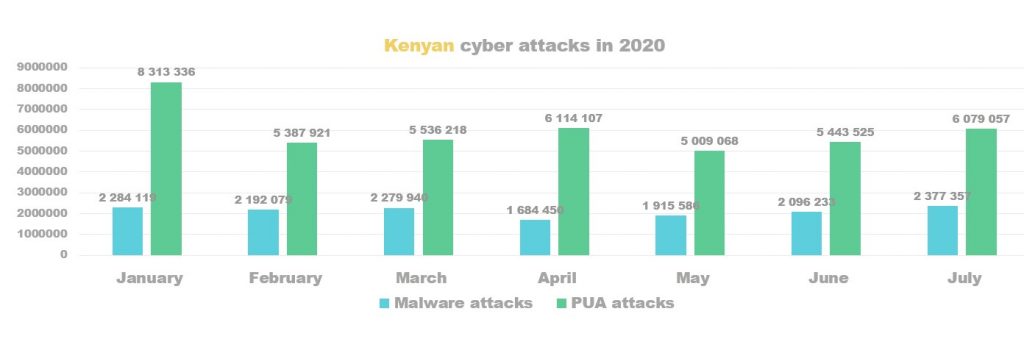There were over 3.8 million malware attacks and 16.8 million Potentially Unwanted Applications (PUA) detections in Nigeria during the first 7 months of 2020, according to a report by Kaspersky Security Solutions.
Potentially unwanted programs (PUA) are spam programs like pornware and adware
The report showed that the PUA detections were four times as much as malware attacks during the period. Globally, Kaspersky reported 28 million malware attacks in 2020 and 102 million detections of PUA by the beginning of August 2020.


Cyber attacks in Africa
Compared to Nigeria, cyber-attacks in Kenya and South Africa have been more intense. In South Africa, there were almost 10 million malware attacks and a staggering 43 million PUA detections.
Similarly, Kenyan users faced around 14 million malware attacks and 41 million PUA detection.
Growing PUA attacks
The data gathered by Kasperky show that PUA is growing in popularity, even more than malware in the region. Researchers noticed that PUAs attack users almost four times more often than traditional malware.
In South Africa, the malware would attack 415,000 users in 7-months of 2020, the figure for PUA would be 736,000.


According to the report, the “grey zone” programs grow in popularity and disturb their experiences, while users might not even know it is there.
Denis Parinov, a security researcher at Kaspersky explained that “The reason why ‘grey zone’ software is growing in popularity is that it is harder to notice at first and that if the program is detected, its creators won’t be considered to be cybercriminals.”
He added that “the problem with PUA is that users are not always aware they consented to the installation of such programs on their device and that in some cases, such programs are exploited or used as a disguise for malware downloads. This is why many security solutions, including ours, flags such programs to make sure users are aware of its presence, influence on their device and activity.”


Unrequested paid offers
Apart from spamming your device, PUA can be used to take money from unsuspecting users. The report explained that PUA programs are usually not considered to be malicious by themselves. However, they are generally influencing user experience in a negative way.
For instance, adware fills user device with ads; aggressive monetising software propagates unrequested paid offers; downloaders may download even more various applications on the device, sometimes malicious ones.
In summary, the report shows that the stay at home policy induced by the pandemic has increased the activities of cyberattackers in the region. It also shows that PUS’s have become more apparent, widespread and more potent than traditional malware.






